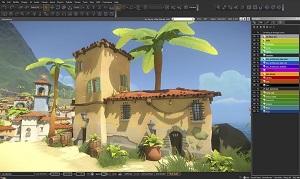News
Amazon Cloud Gets into Professional Game Development
- By David Ramel
- February 9, 2016
Amazon Web Services Inc. (AWS) today announced two new services to help professional game developers create cross-platform games connected in the cloud.
The services -- Lumberyard and GameLift -- provide a complete game development environment, with the former comprising a game engine and a development IDE and the latter providing a back-end, server-side component. The services support building PC games for Windows (Vista and above) or the PlayStation 4 or Xbox One game consoles.
AWS exec Jeff Barr said the company created the services by using existing technologies -- such as the royalty-free CryEngine game engine and Double Helix game studio -- and adding in new ones, including AWS-specific technologies.
On Windows, developers can use Visual Studio 2013 Update 4 or newer editions as their IDE. "You can program your game in the traditional way using C++ and Visual Studio (including access to the AWS SDK for C++) or you can use our Flow Graph tool and the cool new Cloud Canvas to create cloud-connected gameplay features using visual scripting," Barr said in a blog post today.
 [Click on image for larger view.]
The Lumberyard IDE (source: AWS)
[Click on image for larger view.]
The Lumberyard IDE (source: AWS)
The free Lumberyard IDE features built-in content workflows and an asset pipeline, letting developers create indoor or outdoor scenes from a blank canvas and use tools such as Photoshop, Maya or 3ds Max to edit game assets and import them into the IDE.
It provides a full suite of editing tools, including an Asset Browser, AI Debugger, Terrain Editor, Flow Graph visual programming tool, UI Editor and many more.
The Lumberyard game engine lets developers create connected games in the cloud or stand-alone games, with built-in asset management, character development, artificial intelligence (AI), game physics, audio and so on.
For in-game communication and community involvement, Lumberyard integrates with the Twitch video platform and provides brand-new features. "Twitch ChatPlay allows you to build games that respond to keywords in a Twitch chat stream," Barr said. "For example, the audience can vote to have the player take the most desired course of action. Twitch JoinIn allows a broadcaster to invite a member of the audience into to the game from within the chat channel."
The Amazon GameLift back-end service leverages the scaling capabilities of the AWS cloud, automatically adjusting to the number of players. "You simply upload your game server image to AWS and deploy the image into a fleet of EC2 instances that scales up as players connect and play," Barr said. "You don't need to invest in building, scaling, running, or monitoring your own fleet of servers. Instead, you pay a small fee per daily active user (DAU) and the usual EC2 On-Demand rates for the compute capacity, EBS storage and bandwidth that your users consume."
GameLift is available in the US East (Northern Virginia) and US West (Oregon) AWS regions, with more regions to be added.
Lumberyard -- currently in beta -- can be used to create and run either connected or stand-alone games for free, except for any AWS service-specific charges or GameLift charges.
"As part of AWS Free Usage tier, you can run a fleet comprised of one c3.large instance for up to 125 hours per month for a period of one year," Barr said. "After that, you pay the usual On-Demand rates for the EC2 instances that you use, plus a charge for 50GB/month of EBS storage per instance, and $1.50 per month for every 1,000 daily active users."
Note that the Acceptable Use policy advises against use in life-critical or safety-critical systems, with one important caveat regarding any potential zombie apocalypses:
However, this restriction will not apply in the event of the occurrence (certified by the United States Centers for Disease Control or successor body) of a widespread viral infection transmitted via bites or contact with bodily fluids that causes human corpses to reanimate and seek to consume living human flesh, blood, brain or nerve tissue and is likely to result in the fall of organized civilization.
About the Author
David Ramel is an editor and writer at Converge 360.